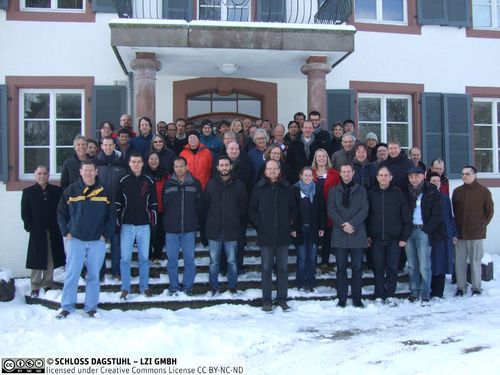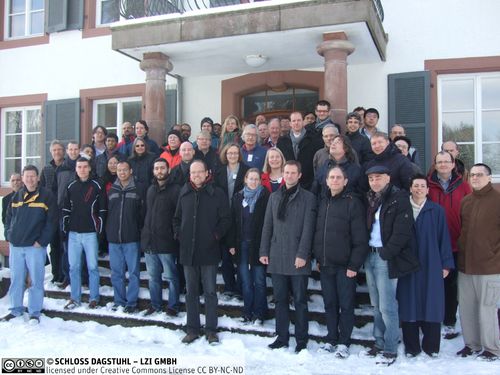Dagstuhl Seminar 13111
Scheduling
( Mar 10 – Mar 15, 2013 )
Permalink
Organizers
- Susanne Albers (HU Berlin, DE)
- Onno J. Boxma (TU Eindhoven, NL)
- Kirk Pruhs (University of Pittsburgh, US)
Contact
- Andreas Dolzmann (for scientific matters)
- Annette Beyer (for administrative matters)
Schedule
The primary objective of the seminar is to facilitate dialog and collaboration between researchers in two different mathematically-oriented scheduling research communities, the stochastic scheduling and queuing community, and the worst-case approximation scheduling community.
To a large extent, the applications considered by the two communities are the same. The stochastic community considers questions related to determining stochastic information (like the expectation or tail bounds) about the performance of algorithms and systems from stochastic information about the input.
The worst-case community considers questions related to determining the worst-case performance of algorithms and systems assuming no stochastic information about the input.
Each community has developed its own set of mathematical techniques that are best suited to answer these different sorts of questions. While addressing similar problems, these communities tend to attend different conferences (e.g. SIGMETRICS vs. SODA/IPCO), and publish in different journals.
Thus the organizers believe each community would benefit from greater interaction with the other community, and this seminar is an opportunity to further such interaction.
The primary objective of the seminar is to facilitate dialog and collaboration between researchers in two different mathematically-oriented scheduling research communities, the stochastic scheduling and queuing community, and the worst-case approximation scheduling community. To a large extent, the applications considered by the two communities are the same. The stochastic community considers questions related to determining stochastic information (like the expectation or tail bounds) about the performance of algorithms and systems from stochastic information about the input. The worst-case community considers questions related to determining the worst-case performance of algorithms and systems assuming no stochastic information about the input. Each community has developed its own set of mathematical techniques that are best suited to answer these different sorts of questions. While addressing similar problems, these communities tend to attend different conferences (e.g. SIGMETRICS vs. SODA/IPCO), and publish in different journals. Thus the organizers believed that each community would benefit from greater interaction with the other community, and this seminar was an opportunity to further such interaction. The seminar was attended by about 15 researchers from the stochastic community and 40 researchers from the worst-case community.
 Susanne Albers, Onno J. Boxma, and Kirk Pruhs
Susanne Albers, Onno J. Boxma, and Kirk Pruhs
- Samuli Aalto (Aalto University, FI) [dblp]
- Susanne Albers (HU Berlin, DE) [dblp]
- Konstantin Avrachenkov (INRIA Sophia Antipolis - Méditerranée, FR) [dblp]
- Urtzi Ayesta (LAAS - Toulouse, FR) [dblp]
- Yossi Azar (Tel Aviv University, IL) [dblp]
- Nikhil Bansal (TU Eindhoven, NL) [dblp]
- Vincenzo Bonifaci (University of Rome "Tor Vergata", IT) [dblp]
- Sem C. Borst (TU Eindhoven, NL) [dblp]
- Onno J. Boxma (TU Eindhoven, NL) [dblp]
- Marek Chrobak (University of California - Riverside, US) [dblp]
- Suzanne Den Hertog (VU University of Amsterdam, NL) [dblp]
- Christoph Dürr (UPMC - Paris, FR) [dblp]
- Friedrich Eisenbrand (EPFL - Lausanne, CH) [dblp]
- Thomas Erlebach (University of Leicester, GB) [dblp]
- Naveen Garg (Indian Inst. of Technology - New Dehli, IN) [dblp]
- Anupam Gupta (Carnegie Mellon University, US) [dblp]
- John Hasenbein (University of Texas - Austin, US) [dblp]
- Wiebke Höhn (TU Berlin, DE) [dblp]
- Sungjin Im (Duke University - Durham, US) [dblp]
- Csanad Imreh (University of Szeged, HU) [dblp]
- Peter Jacko (Lancaster University, GB) [dblp]
- Samir Khuller (University of Maryland - College Park, US) [dblp]
- Ger Koole (VU University Amsterdam, NL) [dblp]
- Amit Kumar (Indian Inst. of Technology - New Dehli, IN) [dblp]
- Fei Li (George Mason University - Fairfax, US) [dblp]
- Alberto Marchetti-Spaccamela (Sapienza University of Rome, IT) [dblp]
- Monaldo Mastrolilli (IDSIA - Manno, CH) [dblp]
- Nicole Megow (TU Berlin, DE) [dblp]
- Rolf H. Möhring (TU Berlin, DE) [dblp]
- Benjamin J. Moseley (TTIC - Chicago, US) [dblp]
- Kamesh Munagala (Duke University - Durham, US) [dblp]
- Viswanath Nagarajan (IBM TJ Watson Research Center - Yorktown Heights, US) [dblp]
- Seffi Naor (Technion - Haifa, IL) [dblp]
- Sindo Nunez Queija (CWI - Amsterdam, NL) [dblp]
- Kirk Pruhs (University of Pittsburgh, US) [dblp]
- Rhonda Righter (University of California - Berkeley, US) [dblp]
- Roman Rischke (TU Berlin, DE) [dblp]
- Jiri Sgall (Charles University - Prague, CZ) [dblp]
- Hadas Shachnai (Technion - Haifa, IL) [dblp]
- Devavrat Shah (MIT - Cambridge, US) [dblp]
- René Sitters (VU University of Amsterdam, NL) [dblp]
- Martin Skutella (TU Berlin, DE) [dblp]
- Frits C. R. Spieksma (KU Leuven, BE) [dblp]
- Mark S. Squillante (IBM TJ Watson Research Center - Yorktown Heights, US) [dblp]
- Clifford Stein (Columbia University, US) [dblp]
- Sebastian Stiller (TU Berlin, DE) [dblp]
- Alexander Stolyar (Bell Labs - Murray Hill, US) [dblp]
- Leen Stougie (CWI - Amsterdam, NL) [dblp]
- Maxim I. Sviridenko (University of Warwick - Coventry, GB) [dblp]
- Marc Uetz (University of Twente, NL) [dblp]
- Peter van de Ven (IBM TJ Watson Research Center - Yorktown Heights, US) [dblp]
- Rob van Stee (MPI für Informatik - Saarbrücken, DE) [dblp]
- Tjark Vredeveld (Maastricht University, NL) [dblp]
- Gideon Weiss (Haifa University, IL) [dblp]
- Gerhard J. Woeginger (TU Eindhoven, NL) [dblp]
- Prudence W. H. Wong (University of Liverpool, GB) [dblp]
Related Seminars
- Dagstuhl Seminar 08071: Scheduling (2008-02-10 - 2008-02-15) (Details)
- Dagstuhl Seminar 10071: Scheduling (2010-02-14 - 2010-02-19) (Details)
- Dagstuhl Seminar 16081: Scheduling (2016-02-21 - 2016-02-26) (Details)
- Dagstuhl Seminar 18101: Scheduling (2018-03-04 - 2018-03-09) (Details)
- Dagstuhl Seminar 20081: Scheduling (2020-02-16 - 2020-02-21) (Details)
- Dagstuhl Seminar 23061: Scheduling (2023-02-05 - 2023-02-10) (Details)
- Dagstuhl Seminar 25121: Scheduling (2025-03-16 - 2025-03-21) (Details)
Classification
- Optimization / Scheduling
Keywords
- Scheduling
- Stochastic Optimization



 Creative Commons BY 3.0 Unported license
Creative Commons BY 3.0 Unported license
